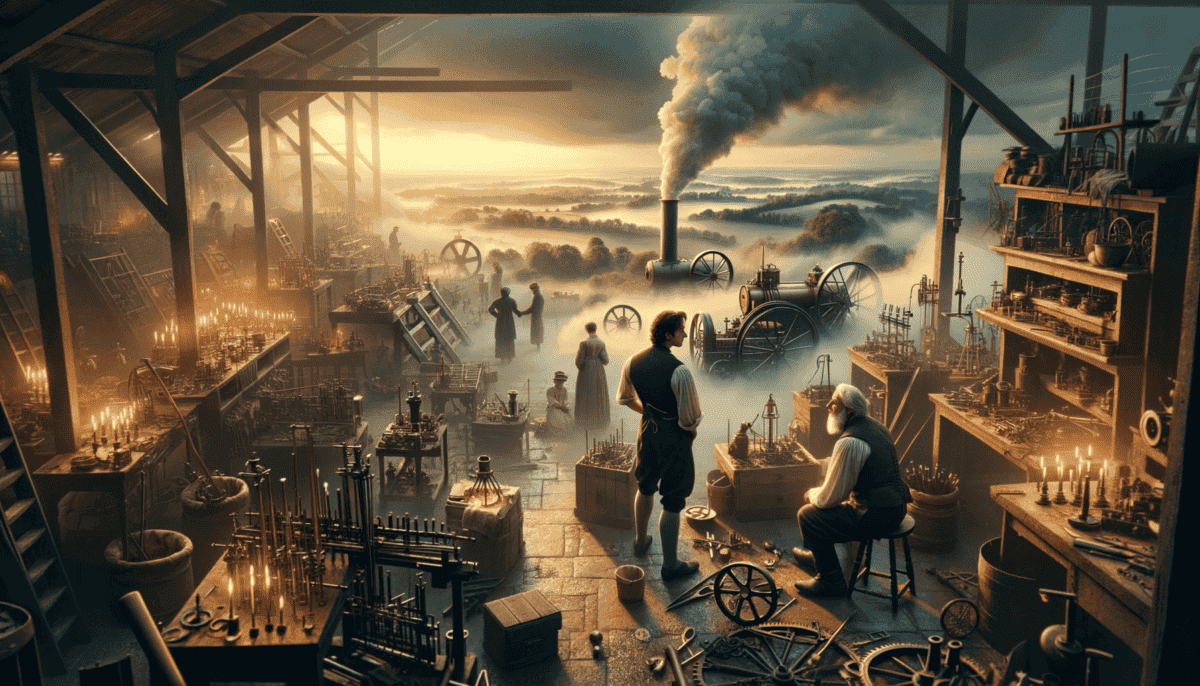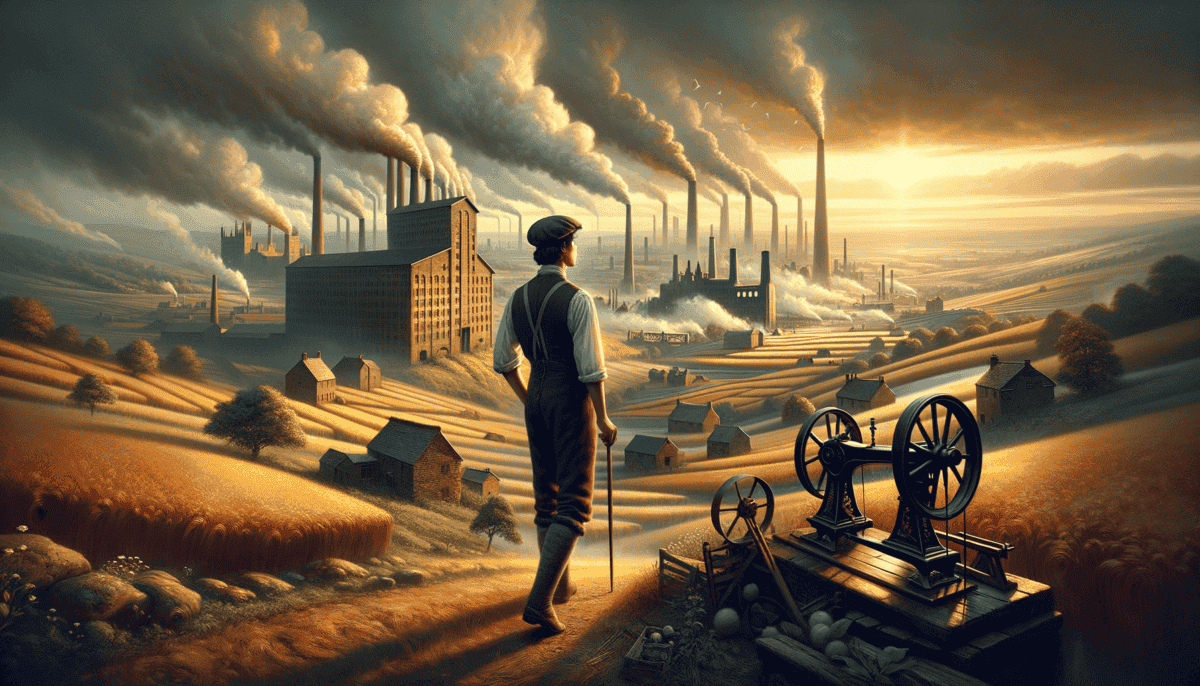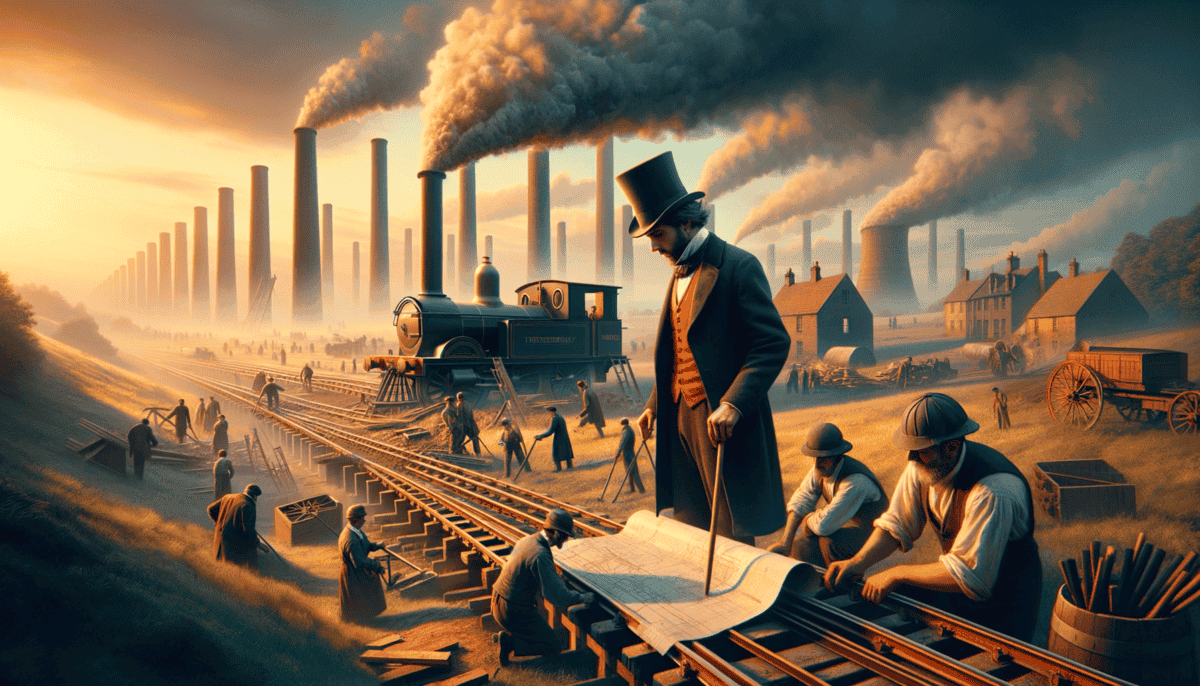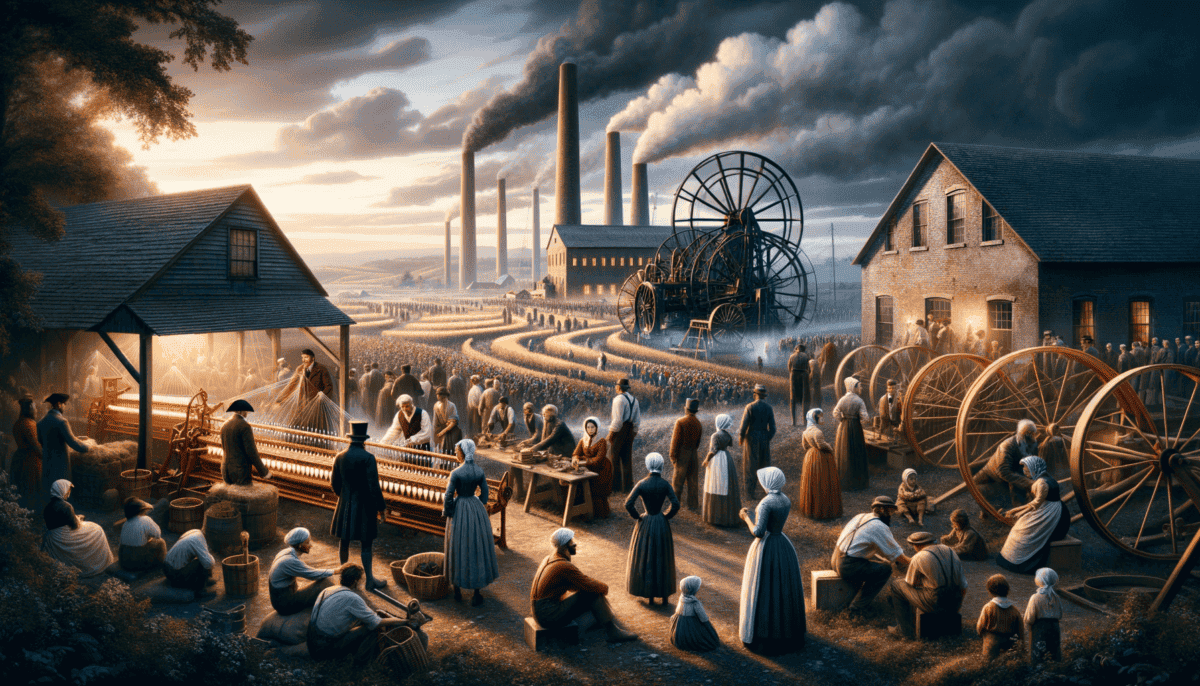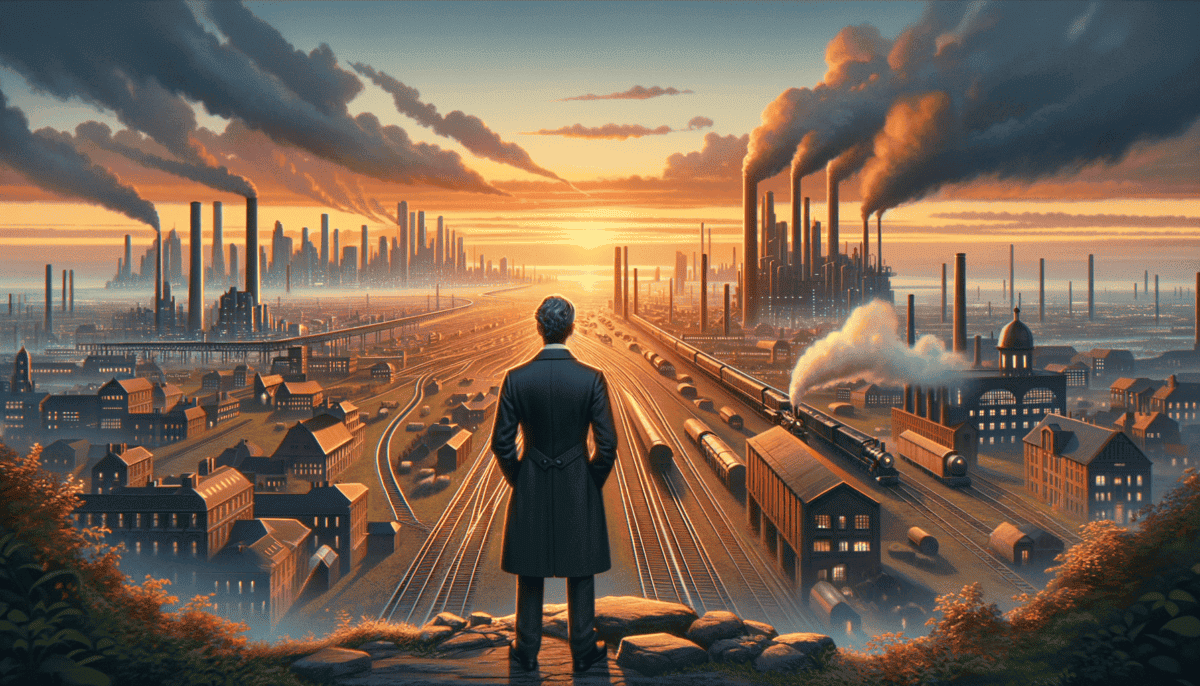Quiet Days in the Village
The morning sun peeked through the thatched roof of Thomas Cooper's small cottage. At twelve years old, he was already up and ready to help his family with their daily work.
"Thomas! Time to milk the cows!" his mother called from downstairs.
Thomas pulled on his worn leather boots and rushed down the creaky wooden steps. The year was 1760, and life in their small English village hadn't changed much in hundreds of years.
A Day of Hard Work
"Everything we make, we make by hand," Thomas's father often said. And it was true. Their village was full of people doing things the old way:
• The baker kneading bread dough with his strong arms
• The blacksmith hammering hot metal into tools
• The weaver working at her small wooden loom
• The farmer plowing fields with horses
• The miller grinding grain with water wheels
Thomas helped milk the cows and feed the chickens before heading to Mr. Brown's workshop. As an apprentice carpenter, Thomas was learning to make furniture the same way people had for generations.
Learning the Trade
"Steady hands, lad," Mr. Brown said, watching Thomas carefully plane a piece of wood. "Every chair, every table – they all need patience and skill."
The workshop smelled of fresh sawdust and wood shavings. Thomas loved working with his hands, but sometimes he wondered if there might be easier ways to do things. His arms would get so tired after a long day of sawing and sanding.
“Why do we make everything by hand?” Thomas asked one day. “Couldn’t we find faster ways?”
Mr. Brown chuckled. "That's just how things are done, boy. One piece at a time, with care and attention. That's the proper way."
Signs of Change
But Thomas noticed little things changing. More traders were coming through their village, bringing news from the big cities. They talked about new ideas and inventions. Some mentioned strange machines that could do the work of many people.
One evening, while Thomas walked home past the village textile workers' cottages, he heard the familiar click-clack of spinning wheels. Mrs. Wilson, the best spinner in the village, was teaching her daughter.
"My cousin in Manchester says they're building huge buildings filled with machines," Mrs. Wilson said. "They say these machines can spin thread faster than a hundred people!"
Thomas's eyes grew wide. A hundred people? He couldn't imagine such a thing.
Dreams of Something More
That night, Thomas couldn't sleep. He thought about machines that could work faster than human hands. The idea was both exciting and a little scary.
Looking out his window at the quiet village, Thomas wondered what changes might come. The stars twinkled above the familiar thatched roofs and the old church steeple. Everything looked the same as it always had, but something was stirring in the world beyond their village.
He pulled out his secret notebook – the one where he drew his own ideas for tools and machines. Maybe someday, he thought, things wouldn't always have to be done the old way. Maybe someday, everything would change.
Little did Thomas know, but his world was about to change in ways he could never imagine. The age of machines was coming, and nothing would ever be the same again.
Steam and Dreams
The summer sun beat down on Thomas as he hurried through the bustling streets of Birmingham. His heart raced with excitement – today he would meet the famous James Watt!
A Special Meeting
“There it is!” Thomas whispered, staring at the workshop where smoke puffed from tall chimneys. Strange noises came from inside – hissing, clanking, and whooshing sounds he’d never heard before.
A tall man with kind eyes opened the door. “Ah, you must be young Thomas! Come in, come in!”
James Watt’s workshop was like nothing Thomas had ever seen. Metal pipes twisted everywhere. Steam leaked from joints with soft whistles. The air felt warm and damp.
The Magic of Steam
“Watch this, lad,” Mr. Watt said, pointing to a large metal cylinder. He pulled a lever, and suddenly the whole thing came alive! A huge beam began moving up and down, powered by nothing but steam.
“But… how?” Thomas asked, his eyes wide with wonder.
Mr. Watt smiled. “It’s simple really. Steam has power. When water gets hot, it wants to expand. We can use that power to make things move!”
“This machine can do the work of twenty horses,” Mr. Watt explained proudly. “And it never gets tired!”
Not Everyone is Happy
Back in the village, Thomas couldn’t stop talking about what he’d seen. But not everyone shared his excitement.
“Machines?” Mr. Brown scoffed. “They’ll never replace skilled hands. Never!”
Mrs. Wilson looked worried. “What about our spinning? Will these steam machines take our work away?”
Thomas’s Big Decision
That night, Thomas made a drawing of the steam engine in his notebook. His hand shook with excitement as he wrote:
Things I Want to Learn:
• How steam engines work
• Making metal parts
• Building new machines
The next morning, Thomas did something brave. He went to talk to Mr. Watt.
“Sir,” he said, trying to keep his voice steady, “could you teach me about steam engines? I want to help build the future!”
Mr. Watt’s eyes twinkled. “My boy, I think you’ve got the spark of an inventor in you. Yes, I’ll teach you – but you must be ready to work hard!”
A New Path Opens
Every day after his regular work, Thomas rushed to Mr. Watt’s workshop. He learned about valves and pistons, pressure and power. His hands got dirty with coal and oil, but his mind filled with wonderful new ideas.
One evening, as steam hissed around them, Mr. Watt put his hand on Thomas’s shoulder. “You know, lad, we’re at the start of something big. These machines will change everything.”
Thomas nodded, thinking about his village, about Mr. Brown’s workshop, about the spinning wheels falling silent. Change was coming, whether people were ready or not. And Thomas knew he wanted to be part of it.
As Thomas walked home that night, the stars seemed brighter than ever. In his pocket, his notebook was full of new drawings and ideas. Tomorrow would bring more wonders, more steam, and more dreams of what might be possible.
Moving to Manchester
Thomas stood at the edge of Manchester, his eyes wide at the forest of tall chimneys reaching into the gray sky. Smoke puffed from them like giant dragons breathing into the clouds.
A Different World
“It’s so… big!” Thomas whispered. The city was nothing like his quiet village. People rushed everywhere. Carts rumbled down cobblestone streets. The air smelled of coal and cotton.
The Amazing Cotton Mill
Mr. Roberts, the mill owner, showed Thomas around his factory. “Watch this!” he said proudly, pointing to a huge machine.
Thomas gasped. Hundreds of spindles whirled at once, spinning cotton into thread faster than any human hands could work. The whole building hummed and shook with power.
“One machine can do the work of fifty people,” Mr. Roberts explained. “And it never gets tired or makes mistakes!”
Meeting New Friends
Sarah, a young mill worker, showed Thomas how to work with the spinning machines. Her quick fingers fixed broken threads in seconds.
“It’s not easy at first,” she said kindly. “But you’ll learn fast. Just be careful of your fingers!” ⚠️
Thomas made friends with other workers too:
• Little Jimmy, who could crawl under machines to clean them
• Old Ben, who knew everything about fixing broken parts
• Mary, who could tie knots faster than anyone
Hard Times and Hope
Working in the mill wasn’t always fun. The machines were loud – CLANK! WHOOSH! BANG! The air was full of cotton dust that made people cough. It was hot in summer and cold in winter.
“Sometimes I miss the quiet of hand-spinning,” Sarah told Thomas during lunch. “But look how much we can make now! My mother used to spin all day to make one spool. Now I can make twenty!”
Changes Big and Small
Thomas wrote in his notebook every night:
Today I saw a machine that can weave cloth as wide as three people! The cotton comes from far away places like America. Everything is changing so fast!
He thought about his village. Mr. Brown’s old workshop seemed tiny now. But was bigger always better? Thomas wasn’t sure.
Learning New Skills
“Want to learn how the machines work?” Old Ben asked one day. Thomas nodded eagerly.
Soon he could fix broken parts and help make the machines run better. His hands got callused, but his mind grew sharper. Every day brought new problems to solve.
A City Growing Up
Manchester grew bigger every day. New buildings rose up. More people came looking for work. The streets got busier and noisier.
“We’re making history,” Mr. Roberts said proudly. “This is the future, Thomas!”
That night, Thomas sat by his window, watching the factory chimneys puff smoke into the starlit sky. The world was changing fast. Some changes were good, like making more clothes for people. Some were hard, like the long hours and dusty air.
He picked up his pencil and started drawing ideas for making the machines better and safer. Maybe he could help make the future a little brighter for everyone.
The Iron Horse Arrives
Thomas wiped sweat from his face as he watched men laying long iron rails across the countryside. The summer sun beat down on dozens of workers hammering and lifting. ️
A New Adventure
“They say these rails will connect Liverpool to Manchester!” said Sarah, who had come to watch. “Can you imagine traveling that far in just a few hours?”
Thomas could hardly believe it. The journey that took days by horse would soon be much faster. Mr. Stephenson, the railway builder, walked over with a big smile.
“Young man, how would you like to help build history?” he asked Thomas. “We need clever hands like yours!”
Building the Railway
Thomas joined the railway team. Every day brought new exciting work:
• Building wooden bridges
• Digging tunnels through hills
• Setting up signal posts
“This is harder than working in the mill,” Thomas told Sarah when she brought lunch. “But I love seeing how it all fits together!”
The Amazing Steam Engine
One sunny morning, Thomas heard a loud whistle. Around the bend came the most amazing thing he’d ever seen – a huge steam locomotive!
“That’s the Rocket,” Mr. Stephenson said proudly. “She can pull many heavy cars and go faster than any horse!”
Dangerous Work
Building the railway wasn’t always safe. One day, little Jimmy from the mill came to watch.
“Be careful!” Thomas warned. “Stay back from the track!”
Just then, a stack of rails slipped. Thomas jumped to push Jimmy away. The rails crashed where Jimmy had been standing!
Connecting Cities
Week by week, the railway grew longer. Thomas watched proud farmers bring crops to new stations. Factory owners sent their goods far away on train cars.
“This railway will change everything,” Sarah said. “Just like the cotton mills did!”
The First Journey
Finally, the big day came. Thomas and Sarah got to ride on the first train from Manchester to Liverpool!
The Rocket’s whistle blew. Steam hissed. The wheels began to turn.
“We’re moving!” Sarah squealed. “Look how fast everything goes by!”
Fields and farms flew past the window. The wind whipped their hair. Thomas couldn’t stop grinning.
A World Getting Smaller
That evening, Thomas wrote in his notebook:
He looked at his rough hands, now strong from railway work. The world was changing fast, but he was helping build that new world, rail by rail.
Sarah peeked over his shoulder. “What will you help build next, Thomas?”
“I don’t know,” he smiled. “But I can’t wait to find out!”
As the sun set, they heard a distant train whistle. Somewhere out there, another steam engine was racing across the land, carrying people and goods to new places, connecting cities and dreams.
Standing Together
Thomas pulled his thin coat tighter as he walked to the mill. The early morning fog hung heavy over Manchester’s crowded streets. Through the mist, he saw small shapes hurrying – children heading to work just like him.
A Hard Day’s Work
“Morning Tommy!” called little Mary, a 9-year-old who worked at his mill. Her face was already smudged with cotton dust.
“You’re coughing again,” Thomas frowned. “How long have you been working today?”
“Since midnight,” she whispered. “Mum needs the extra pennies.”
Time for Change
That evening, Thomas heard excited whispers about a workers’ meeting. Sarah grabbed his arm as he left the mill.
“Come with me,” she said. “People are gathering to talk about making things better!”
The Secret Meeting
In a dim basement room, workers huddled together. A tall man named Robert Owen stood up to speak.
“Children shouldn’t work such long hours! We need safer machines! Better pay for honest work! Who will stand with me?”
Thomas felt his heart pound. He thought of little Mary’s cough, of tired children, of dangerous machines.
“I will!” he called out, standing up.
Taking Action
Over the next weeks, Thomas helped spread the word. Workers began to organize:
• Making signs
• Planning peaceful protests
• Speaking up for children’s rights
• Asking for safer working conditions
The Big Strike
One cold morning, the workers didn’t go into the mills. They stood outside instead, holding signs.
“What if we lose our jobs?” Sarah worried.
“What if we don’t try to make things better?” Thomas answered. “Someone has to speak up!”
Small Victories
Days passed. More people joined them. Finally, the mill owners agreed to talk.
“Children under 10 won’t work in the mills anymore,” the owner announced. “And we’ll put guards on the dangerous machines.”
A New Hope
Thomas watched Mary skip home early one afternoon, no longer working midnight shifts. Her cough was getting better.
“Thank you, Tommy,” she smiled, giving him a small flower. “The air feels fresher now!”
Sarah squeezed his hand. “We’re not done yet, are we?”
“No,” Thomas said firmly. “This is just the beginning. When people stand together, we can make real change happen!”
As they walked home, Thomas saw children playing in the streets instead of working. The machines were still running, but now they were safer. People walked with their heads held higher.
The world was changing again, but this time it was changing for the better.
Dreams of Tomorrow
The year was 1840, and Thomas stood at his workshop window, watching the bustling streets of Manchester. Steam engines puffed in the distance, and railway whistles echoed through the air.
A New Beginning
“Uncle Thomas! Uncle Thomas!” Little Emma, Sarah’s daughter, tugged at his sleeve. “Tell me about the old days again!”
Thomas smiled, remembering his journey from a small village to this transformed world. “When I was your age, there were no trains or big factories. We made everything by hand.”
Looking Back
“What’s this?” Emma pointed to an old spinning wheel in the corner.
“That’s how we used to make thread before the big machines,” Thomas explained. “One person could make a tiny bit of thread each day. Now the machines can make enough for hundreds of people!”
A Better World
Sarah entered the workshop, carrying fresh bread from the new bakery. “Remember when we fought for workers’ rights, Thomas?”
“We made real change happen,” Thomas nodded. “Now children go to school instead of working in mills, and factories are safer.”
Moving Forward
Thomas took Emma to the window. Below, they watched:
• Children walking to school
• Workers heading home at reasonable hours
• New shops opening
• Clean, safe factories running
Signs of Progress
“Look!” Emma pointed excitedly. “Is that one of Mr. Stephenson’s new steam engines?”
“Yes, and it’s faster than the first ones we built,” Thomas grinned. “People said we were dreamers back then, but look at us now!”
The Future Calls
“What do you think comes next, Uncle Thomas?” Emma asked, her eyes bright with curiosity.
“That’s the most exciting part, little one. The world keeps changing. Maybe someday we’ll have machines that can fly, or ways to talk to people far away!”
A Lasting Legacy
That evening, Thomas wrote in his journal: “We built more than just machines. We built hope. We showed that people working together can make the world better.” ✨
Sarah joined him by the fireplace. “You’re still dreaming up new ideas, aren’t you?”
“Always,” Thomas smiled. “The Industrial Revolution taught us that anything is possible when we dare to imagine it.”
Emma fell asleep listening to the distant sound of steam engines. In her dreams, machines soared through the sky, and people from all over the world could talk to each other in an instant.
And Thomas knew that this was just the beginning. The world would keep changing, keep growing, keep dreaming. Each generation would build something new, something better.
As he closed his workshop for the night, Thomas looked up at the stars. The same stars had watched over him as a young apprentice, had seen the rise of steam power, had witnessed the fight for workers’ rights. Now they twinkled with the promise of tomorrow.
The machines had changed their world, but it was people – brave, caring, determined people – who had made sure those changes led to a brighter future for everyone.


